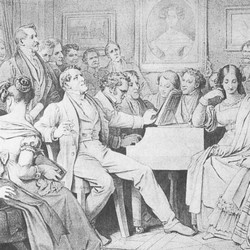- Details

Moritz von Schwind arrived at Munich in 1828 to learn under Peter von Cornelius, Professor at the Academy of Fine Arts (two decades later, Schwind also became a Professor at the same art academy). Munich was at that time a much more stimulating place for artists than Vienna, where Schwind was born and had lived until then; King Ludwig I of Bavaria was an art lover (he founded the Glyptothek and the Neue Pinakothek, for example) and there were plenty of opportunities for young painters.
- Details

Musical works with choir and soloists are customary in symphonic seasons: symphonies such as Beethoven's Ninth or some by Mahler, masses, oratorios... even operas presented in concert version. But, as so often happens, some works are regularly programmed and some others, really beautiful, are hardly performed. Among these, Rosamunde, D. 797, a work by Franz Schubert that (please allow me some advice) run to listen to it if you haven’t done it yet.
- Details

The second edition of Horace Walpole's The Castle of Otranto (first published in 1764) was subtitled “a Gothic novel”. Romanticism embraced this new genre with great enthusiasm and bookshelves began to fill up with freshly printed supernatural episodes, a trend that lasted until the Victorian era (I must admit that gothic novel is also well represented on my bookshelves).
- Details

Robert Schumann was a grown man at his thirty when he started composing lieder at a stretch, masterpiece after masterpiece; Today, when discounted tickets in concerts are for under-35-olds, it may seem he was a young man, but no doubt he was a grown man. However, everyone has a past, Schumann, too, and today we're listening to one of the songs he wrote when he was a young man, at his seventeen or eighteen; It is not a masterpiece, but who needs it?
- Details

Walt Whitman is one of the essential poets in American literature. This year marks the bicentenary of his birth, so we have a perfect excuse to listen to a third song with one of his poems, after listening to O you who I often and silently come by Ned Rorem and To what you said by Leonard Bernstein.













